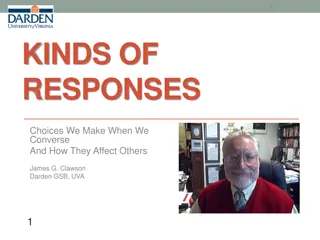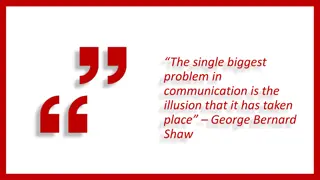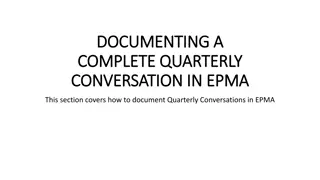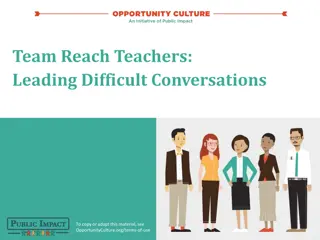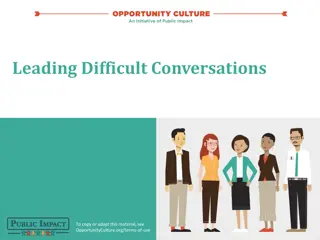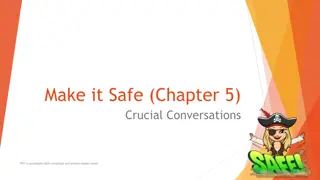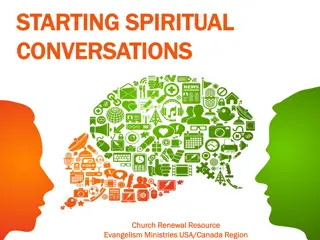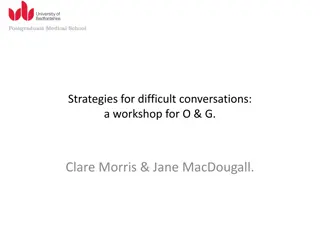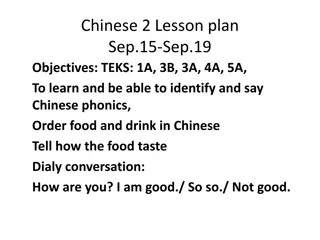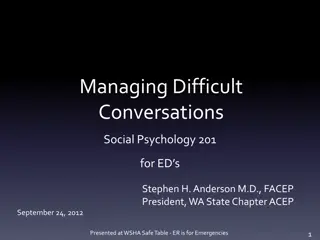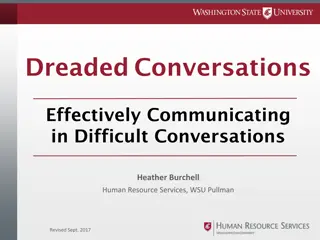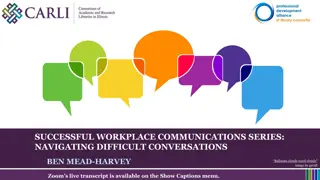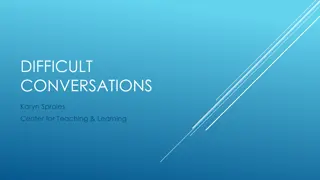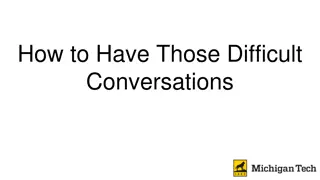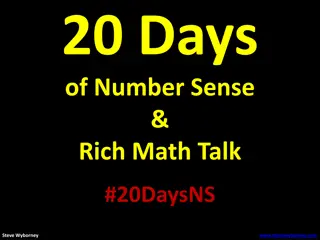
Effective Strategies for Bold Conversations and Conflict Resolution
Discover tips on navigating difficult conversations with confidence and empathy from the AAUW of Iowa Spring Conference. Learn about the importance of self-examination, curiosity, active listening, and increasing awareness in conversations. Explore how to handle discomfort and cognitive biases while promoting open dialogue and understanding. Join the discussion on embracing diverse viewpoints and enhancing communication skills for meaningful connections.
Download Presentation

Please find below an Image/Link to download the presentation.
The content on the website is provided AS IS for your information and personal use only. It may not be sold, licensed, or shared on other websites without obtaining consent from the author. If you encounter any issues during the download, it is possible that the publisher has removed the file from their server.
You are allowed to download the files provided on this website for personal or commercial use, subject to the condition that they are used lawfully. All files are the property of their respective owners.
The content on the website is provided AS IS for your information and personal use only. It may not be sold, licensed, or shared on other websites without obtaining consent from the author.
E N D
Presentation Transcript
AAUW OF IOWA SPRING CONFERENCE APRIL 26, 2025 DIFFICULT CONVERSATIONS TIPS TO BE BOLD
SUSAN LANGAN CEDAR FALLS-WATERLOO AAUW MEMBER and DIVERSITY OFFICER RETIRED SCHOOL COUNSELOR WIFE, SISTER, AUNT, FRIEND
How many of you have had a difficult conversation recently? This could be with friends, family, or colleagues. Conversations can spring to life in so many different settings whether it's a light-hearted chat with friends, a heartfelt discussion with family, or a brainstorming session with colleagues. Each interaction brings its own unique vibe and energy, turning ordinary moments into memorable exchanges. TABLE TALK
Sometimes, conversations change in unexpected ways. This can help us discover new ideas or viewpoints that we might not agree with. It s interesting to think about how we feel in these moments. Do we decide to share our thoughts, or do we choose to listen quietly? Engaging in these discussions can really improve our understanding and connections with others!
We will learn 5 principles to have bold conversations. #1 Self examine by honestly asking yourself whether in fact you have an agenda. #2 Be curious #3 Listen with an intent to understand #4 You may react to what the other person is saying with confusion, anger or frustration. That is NORMAL. #5 The point is not to win the argument but to increase awareness.
Thank you Maria and Lori!! Conversation #1
The discomfort you feel when presented with ideas that conflict with your values or beliefs. We double down or get defensive. Cognitive bias If I am late, there is a good reason. If someone else is late, they are lazy or unorganized. Attribution bias
When we are stuck. How clearly did we state your position? How fairly and thoroughly can you state the other side? Are there other perspectives that provide a broader perspective?
#1 Principle Self examine for an agenda Positionality and self reflection Wheel of privilege and power
TABLE TALK
Principle #2 Be Curious Curiosity helps to strengthen relationships Curiosity has a positive effective on developing interpersonal closeness Curiosity improves healthcare outcomes
TABLE TALK
Principle #3 Listen with intent to understand Helping ourselves and our members through conflict conversations Pausing before reacting and reflecting
TABLE TALK
Principle #4 Frustration is normal Take a relaxed approach to the conversation. Helps with reasoning and understanding Start a conversation with neutral questions Being aware of the surroundings (home, workplace, social, community) Being aware of conversation timing and other preferences
TABLE TALK
Principle #5 The point is not to win the argument but to raise awareness Increasing awareness means understanding differences Beliefs and actions tend to come from people s backgrounds Acceptance works both ways I can control my reactions and responses but I cannot control others
TABLE TALK
Making space for different perspectives Consciously create an environment for participants to feel comfortable Become aware of cultural norms and values that may shape others perspectives.
Thank you Maria and Lori!! Conversation #2
TIPS TO REMEMBER IT TAKES TIME TO PROCESS NEW OR DIFFERENT INFORMATION OTHER FACTORS ALSO PLAY A ROLE IN HOW A PERSON PROCESSES INFORMATION IT TAKES TIME TO UNDERSTAND EACH OTHER SOME MATTERS REQUIRE MORE THAN ONE CONVERSATION HAVING CIVIL CONVERSATIONS HELPS BOTH PARTIES IN THE CONVERSATION AAUW CIVILITY POLICY
Resources available on AAUW website
Questions? Comments? Suggestions?
THANK YOU!!


